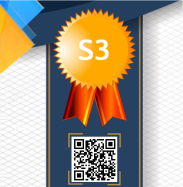Students’ Perception on the Use of Video Conferencing Software for Learning during the COVID-19 Pandemic
Abstract
This study analyzes how students perceive the use of video conferencing software for educational purposes during the epidemic. During a pandemic, the researcher focuses on the students' use of Zoom, Google Meet, and Skype. This study's samples consist of six UIN Ar-Raniry English Language Department students with the online learning experience. This qualitative research collects data through interviews using purposive sampling. Several positive responses revealed that video conferencing software offers numerous advantages during the pandemic. Utilizing Zoom, Google Meet, and Skype is the most effective method for applying online learning throughout the pandemic's hard conditions. However, challenges such as adaptability to technological use, technical difficulties, and lack of computer literacy are inevitable.
Keywords
Full Text:
PDFReferences
Arief Eko Priyo Atmojo, “EFL Teachers’ Online Teacher Professional Development Experiences amidst the COVID-19 Pandemic: Practices and Perceptions.” Englisia: Journal of Language, Education, and Humanities 9, no. 1 (November 7, 2021): 1–9. https://doi.org/10.22373/ej.v9i1.9127.
Bramianto Setiawan, and Vina Iasha. “COVID-19 Pandemic: The Influence of Full-Online Learning for Elementary School in Rural Areas.” Jurnal JPSD: Jurrnal Pendidikan Sekolah Dasar 6, no. 2 (2020): 114–23. https://doi.org/10.30870/jpsd.v6i2.8400.
Duygu Candarli, and H. Gulru Yuksel. “Students’ Perceptions of Video-Conferencing in the Classrooms in Higher Education.” Procedia - Social and Behavioral Sciences 47 (2012): 357–61. https://doi.org/10.1016/j.sbspro.2012.06.663.
Emawati. “Pembelajaran Online: Persepsi Dan Penerapannya Di Universitas Muhammadiyah Aceh.” Jurnal Ilmiah Didaktika 22, no. 1 (2022): 162–76.
Habiburrahim. “The Advantages and Challenges of Internet for Higher Education.” Jurnal Ilmiah Didaktika 13, no. 1 (2012): 173–82.
Ismail Hanif Batubara, Kholidah Nur, Ali Topan Lubis, and Nanang Arianto. “The Effectiveness of Learning Using Social Media during the Covid 19 Pandemic in Higher Education.” Budapest International Research and Critics Institute (BIRCI-Journal): Humanities and Social Sciences 4, no. 2 (May 3, 2021): 2177 83. https://doi.org/10.33258/birci.v4i2.1908.
María Francisca Blasco, “E-Learning Using Video Conferencing Applications: How Is Google Meet Perceived among Students?” In Proceedings of The 2nd World Conference on Research in Education. Acavent, 2020. https://doi.org/10.33422/2nd.worldcre.2020.09.217.
Michael Hangga Wismabrata, “Viral, Foto Sejumlah Siswa Panjat Pohon Cari Sinyal Untuk Belajar Daring Di Simalungun.” Kompas.Com August 1, 2020. https://regional.kompas.com/read/2020/08/01/18100071/viral-foto-sejumlah-siswa-panjat-pohon-cari-sinyal-untuk-belajar-daring-di?page=all.
Moch. Bambang Sulistio, “Comparative Study of E-Learning Readiness and Socio-Economic Factors during Covid-19 Pandemic: Evidence from High School Students in Urban and Rural Areas of Indonesia.” In 1st International Conference on Teaching, Education and Learning Conference, 14–29, 2021. https://doi.org/10.32789/tel.2021.1002.
Norma I. Scagnoli, Jinhee Choo, and Jing Tian. “Students’ Insights on the Use of Video Lectures in Online Classes.” British Journal of Educational Technology 50, no. 1 (January 2019): 399–414. https://doi.org/10.1111/bjet.12572.
Rahmat Yusny, Fitria Rizki, Ika Kana Trisnawati, and Mulia Mulia. “Offline or Online?: EFL Students’ Perceptions on Working in Face-to-Face and Virtual Learning Modes.” Englisia: Journal of Language, Education, and Humanities 9, no. 1 (November 7, 2021): 113–20. https://doi.org/10.22373/ej.v9i1.10364.
Rimba Hamid, Izlan Sentryo, and Sakka Hasan. “Online Learning and Its Problems in the Covid-19 Emergency Period.” Jurnal Prima Edukasia 8, no. 1 (January 29, 2020): 86–95. https://doi.org/10.21831/jpe.v8i1.32165.
Saiful Akmal, “Belajar Di Era 4.0: Tidak Melulu ‘High-Tech.’” Aceh Trend, November 25, 2019. https://www.acehtrend.com/news/belajar-di-era-4-0-tidak-melulu-high-tech/amp.html#.
Sokhira LindaVinde Rambe, “Creative Techniques for Online Learning Assessment.” Englisia: Journal of Language, Education, and Humanities 8, no. 2 (May 3, 2021): 138–47. https://doi.org/10.22373/ej.v8i2.8111.
Toni Malinovski, Tatjana Vasileva-Stojanovska, Dobri Jovevski, Marina Vasileva, and Vladimir Trajkovik. “Adult Students’ Perceptions in Distance Education Learning Environments Based on a Videoconferencing Platform – QoE Analysis.” Journal of Information Technology Education: Research 14, no. 1 (2015): 1–19. https://doi.org/10.28945/2091.
DOI: http://dx.doi.org/10.22373/jid.v23i1.14433
Refbacks
- There are currently no refbacks.
except where otherwise noted.



